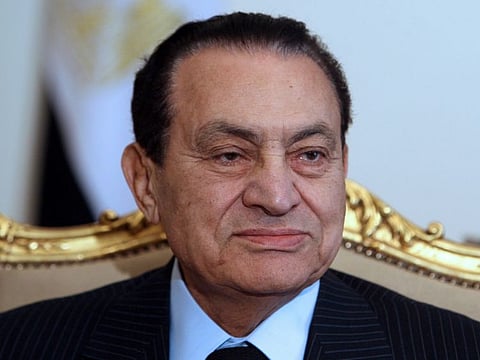Mubarak warns against US 'deal of century' for Palestine
Netanyahu does not believe in a two-state solution, former president says

Kuwait City: Former Egyptian president Hosni Mubarak has warned against an alleged US plan for Middle East peace, reportedly excluding a two-state formula for Palestinians and Israelis.
“Lasting and fair solution is the essential guarantee to end the [Palestinian-Israeli] conflict. Any solution, to be imposed on the region due to power imbalances will not last and will be a temporary solution that would instigate the situation to explode at any time,” Mubarak said in an interview with the Kuwait newspaper Al Anba.
Officials in the US administration have recently said details of the US plan, dubbed the “Deal of the Century” will be released after the current Muslim month of Ramadan that ends early in June.
Mubarak, an-chief of Egypt’s air force, cited a peace initiative launched in 2002 by the then Saudi king Abdullah Bin Abdul Aziz, which offered Israel recognition in return for its withdrawal from the occupied Arab territories.
“The initiative said that the Arab countries welcome cooperation and normal ties with Israel provided that fair and comprehensive peace is reached, entailing the creation of the Palestinian state and withdrawal from the occupied lands,” he added.
While downplaying media reports about details of the impending US plan, 91-year-old Mubarak cited “non-assuring” signs.
Also Read: Call to help save Palestine from Trump deal
Also Read: Bahrain defends hosting Mideast conference
“[They include] relocation of the American embassy to Jerusalem, US recognition of Israel’s annexation of the [Syrian] Golan and the constant Israeli expansion of settlements in the occupied lands,” he said. “In general, the Arabs should be ready to move and respond to the US formula when its features become officially clear.”
He added that incumbent Israeli Prime Minister Benjamin Netanyahu is not interested in the two-state solution and does not believe in the land-for-peace swap.
“He wants to separate Gaza from the [West] Bank. He talked to me about this topic when he visited me in late 2010. He told me if it is possible that Palestinians in Gaza could take part of the border strip in Sinai. I told him to forget this and not to raise the issue with me again. We would fight each other again. He told me ‘No’ and the talk was over,” recalled Mubarak, who ruled Egypt for 30 years until he resigned following the 2011 uprising.
Egypt was the first Arab country to sign a peace treaty with Israel in 1979. However, their relations have been mostly frosty.
Mubarak termed the Trump administration as “non-traditional”, but called on it to realize the nature of the Middle East and its decades-old woes.
“I see the decision of the transfer of the American embassy, the recognition of Israel’s annexation of Golan and condoning constant settlement expansion in the occupied lands as largely undermining chances for peace in the region,” he said.
“If the new course, which the American administration plans to put forward, would not address the intrinsic issues lying at the core of the conflict, it would be hard to imagine that it will succeed in reaching fair and durable peace in the region.”
Asked if Iran is more dangerous to the Arab region than Israel, Mubarak called for grappling with both threats at the same time.
“I don’t deny that Iran seeks to infiltrate deeper into the region. This threatens the Arab national security,” he said. “Since 2011 [revolts], all powers that have ambitions in our region have taken advantage of that historical event to fulfill their interests.”
He remembered that during the 2011 uprising in Egypt, Iran’s supreme guide delivered a Friday sermon in Arabic, calling for an Islamic revolution-style revolt in Egypt. “Iran’s ambitions are obvious. There should be no silence on their threats to the Gulf. But, Israel’s ambitions are obvious, too, especially under the current government. Both topics should be dealt with in a way that ensures that none of them will overshadow the other,” he said.



